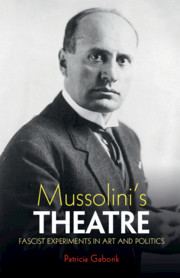'Mussolini was a protean figure, with a sponge-like capacity to absorb and shape himself to the cultural currents of his time; and in 1920s–30s Italy, one of the most vital of these currents was the theatre. Patricia Gaborik’s book vividly explores the stage-world of Fascist Italy, placing the dictator at its heart as critic, impresario, dramaturge, and censor. Bringing this aspect into arresting focus, Mussolini’s Theatre achieves the rare feat of saying something illuminating and new about Il Duce and Fascism.'
Professor Robert S. C. Gordon - University of Cambridge; author of The Holocaust in Italian Culture, 1944–2010
'Mussolini’s Theatre is well written, convincingly presented, and engaging to read, with excellent, telling examples. It makes a highly important contribution to modern cultural and theatrical history.'
Distinguished Professor Marvin Carlson - The Graduate Center, City University of New York; author of Theories of the Theatre
'This formidable study is extremely rich in its documentation, extremely perceptive in its analysis, and extremely courageous in recognizing the breadth and intelligence of Mussolini’s cultural project. Instead of repeating the usually caricatured image of the Duce as a performer, Patricia Gaborik shows how complex the Fascist interventions in the theatre were within the context of a politics built upon charisma. Deeply researched and acute in overcoming the conventional opposition between aestheticization of politics and politicization of aesthetics, Mussolini’s Theatre is not just relevant for theatre specialists, but very important for historians of modern Italy as well.'
Professor Sergio Luzzatto - University of Connecticut; winner of the Cundill Prize in History, and author of The Body of Il Duce
‘Engagingly written and based on a deep reading of primary sources and the relevant Italian and English scholarship, this incomparably learned monograph is critical for Italian Fascist, modern Italian, and theater studies … Highly recommended.’
J. T. Mellone
Source: Choice Connect
‘Gaborik has a distinct and pleasant authorial voice with a knack for narrative. Her book demonstrates excellent research across a wide range of sources, with persuasive and convincing arguments that will prove crucial for scholars and students of twentieth-century European drama and history. At the same time, her descriptions tell an intriguing story as they detail scenes, depict complexities of the anti-hero’s inner life, and suspensefully reveal theraw power that Mussolini appreciated in the relationship between theatre, politics, and the people.’
Juliet Guzzetta
Source: Modern Drama
‘Mussolini’s Theatre is not just a well-researched study of Mussolini’s attempt to weaponise art for ideological goals, but also provides a useful framework to understand how totalitarianism can at times use a silk glove rather than an iron gauntlet.’
Jacopo Pili
Source: Journal of Contemporary History
‘[This book is] not only a much-needed contribution to scholarship on the theatre of the Fascist years, but also offers wide-ranging applications, making it essential reading for anyone engaged in questions of culture during the ventennio.’
Joseph Kelly
Source: Modern Language Review
‘… deeply researched and meticulously detailed … Gaborik’s study provides a wealth of information on a variety of subjects that should be especially useful to scholars in theatrical studies.’
Anthony L. Cardoza
Source: Journal of Modern History



